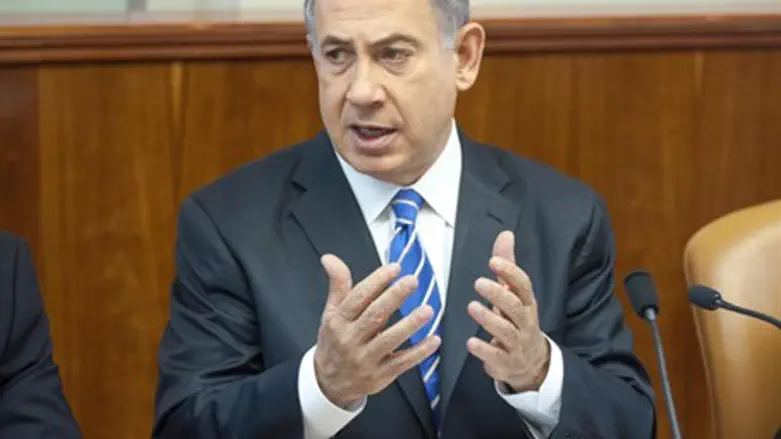
Prime Minister Binyamin Netanyahu made some seemingly controversial statements to Bloomberg View last Friday, which a senior official argued were misconstrued by the interviewer.
The interview was published this Thursday in time for former New York Mayor Michael Bloomberg's reception of the Genesis Prize, presented in Jerusalem by Netanyahu.
Speaking about the failed peace talks with the Palestinian Authority (PA), Netanyahu reiterated that he wants "a demilitarized Palestinian state that recognizes the Jewish state." Given the failure of the negotiations, he hinted that he is considering unilateral moves.
"It’s true that the idea of taking unilateral steps is gaining ground, from the center-left to the center-right. Many Israelis are asking themselves if there are certain unilateral steps that could theoretically make sense," said Netanyahu.
Interviewer Jeffrey Goldberg reported that Netanyahu insinuated a "disengagement" from parts of Judea and Samaria, "even if this means uprooting Jewish settlements."
A senior official told Arutz Sheva that the insinuation was purely made by the interviewer, saying "Netanyahu didn't say at any point in the interview that he is considering to conduct withdrawals, and more than that he emphasized the danger of unilateral withdrawals as seen in the 2005 disengagement plan (from Gaza)."
Another unilateral plan suggested this week that Netanyahu may have been referring to was the annexation of "Area C," made by Economics Minister Naftali Bennett.
Writing in the Wall Street Journal on Tuesday, Bennett proposed giving "Palestinians complete freedom of movement, which requires removing all roadblocks and checkpoints in the West Bank. In particular, Israel should dismantle the security barrier erected throughout the last decade to defend against Palestinian terror attacks during the Second Intifada."
Bennett further proposed Arab autonomy in Areas A and B, and the offering of full Israeli citizenship to Arab residents of Area C. Justice Minister Tzipi Livni slammed the proposal as "the end of Zionism."
"We have no partner"
Netanyahu continued in the interview to remark on the PA's recent unilateral international moves and unity deal with Hamas, which torpedoed the peace talks. He stated PA Chairman Mahmoud Abbas "is unable or unwilling to grapple with the core issues of the conflict."
"There is an emerging consensus that we don’t have a partner who can challenge constituencies, do something unpopular, do something that is difficult. Abbas has not done anything to challenge the prevailing Palestinian consensus," accused Netanyahu.
Defending his own willingness to take "unpopular" moves, Netanyahu said "I gave the speech at Bar Ilan University, a religious university, five years ago recognizing the two-state solution. Second, I tried a ten month (construction) freeze, and Abbas did nothing. Then I did something that was the toughest of all - I released terrorist prisoners, killers of innocent people. That was the hardest decision."
“And what has Abbas done? Nothing," remarked Netanyau.
When asked about implementing another construction freeze in Judea, Samaria and eastern Jerusalem, the prime minister said "having tried once, I saw that it doesn’t work."
On the issue of freezes, it should be noted that reports two weeks ago stated that Netanyahu requested that the Housing Ministry freeze new construction projects in Judea and Samaria.
The prime minister expanded on the topic of a freeze, saying the American administration demanded either a freeze or terrorist releases to bring Abbas to the talks, and that he chose terrorist releases.
Speaking about the core of the issue, Netanyahu said "from 1920, when this conflict effectively began, until 1967, there wasn’t a single Israeli settlement or a single Israeli soldier in the territories, and yet this conflict raged," because of the "persistent refusal to recognize a Jewish state, before it was established and after it was established."
Netanyahu added "no new settlements have been built since the time I was first prime minister, which was 1996."
Not spying on the US, but also not limited to US alliance
The prime minister also discussed relations with the US, which recently hit a new point of tension in allegations that Israel had spied on America, allegations dismissed by US Defense Secretary Chuck Hagel.
Netanyahu denied the reports, saying “Israel has not conducted any espionage operations in the United States, period. Full stop. Not direct espionage, not indirect espionage, nothing, zero."
While Netanyahu commended US President Barack Obama's decision to abort an attack on Syria in favor of negotiating the destruction of the regime's chemical weapons stockpile, he noted disagreement regarding negotiations on Iran's nuclear program.
"The Americans say, 'we will not let Iran have nuclear weapons.' We say we should not let Iran have the capability to produce nuclear weapons," said Netanyahu, warning about the dangers of breakout capacity.
When asked about his talk last Friday with newly elected Indian Prime Minister Narendra Modi, hailed as “Israel's best friend in South Asia," Netanyahu discussed Israel's expanding international relations.
"Israel is rapidly developing relations in Asia. I was recently in China, and I just came back from Japan. ...These countries and companies are not being held back by the continuing conflict," Netanyahu reported.
Netanyahu on Tuesday approved a landmark plan to deepen and widen bilateral financial ties with China, during the visit of Chinese Vice Premier Liu Yandong to Israel.